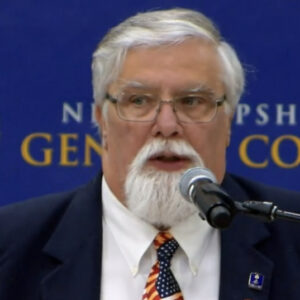If anyone was happy with the biennial budget passed by the GOP-controlled House Thursday, it didn’t show.
While the $16.3 billion budget passed along mostly partisan lines, nearly everyone lost something in the process — a process that included quite a bit of chaos and, at times, took GOP leadership to the brink of failure.
During a grueling day-long session, tempers flared, House leaders floundered, and Nazi Germany was evoked. The House was able to pass HB1 despite 15 defections from Republicans unhappy the budget didn’t cut more spending.
But it was HB2 that brought the real drama.
Just before 6 p.m., and after eight hours of budget talks, frustrated lawmakers voted 198-167 to table HB 2 – the trailer dealing with “fees, funds, revenues, and expenditures.”
At issue was a deal on state pensions within the caucus between fiscal hawks who reluctantly agreed to support increased spending for Group II retirees, in exchange for support moving new Group III retirees to a 401(k) style defined contribution system.
Derry Republican Rep. Stephen Pearson, a Manchester firefighter who is covered by the Group II spending, moved to blow up the deal by killing the shift to defined contributions. GOP leaders were unable to keep enough Republicans on board, and the pension reform was killed, 183-177.
Rep. Michael Granger (R-Milton Mills) then moved to table the entire trailer, and the House voted 198-167 in favor. Speaker Sherm Packard put the House in recess, and the GOP caucus huddled up.
Rep. Joe Sweeney (R-Salem) told NHJournal that during the recess, “We caucused. We discussed our differing opinions; we came to an agreement.”
Other members of the GOP caucus were less sanguine.
“Basically, we just had it out,” one frustrated House Republican told NHJournal on background. “Some people were shamed.”
When the House session resumed about 45 minutes later, Granger made the motion to reintroduce HB 2. This time, lawmakers voted to bring back the legislation 193-170.
“It’s always good to have a nice little huddle,” Granger announced. “We’re going to be sticking together.”
The House rolled through the rest of the amendments with little drama. In the end, the vote was 185-175 to send the budget on to the Senate, where it will receive a less-than-warm reception.
“This budget reflects our values,” said House Majority Leader Jason Osborne (R-Auburn). “It puts the New Hampshire taxpayers first and not the bureaucracies that have ballooned and bloated since 2020.”
Democrats denounced the spending plan, offering what they called their own “Better Budget” instead. It used increased taxes on gaming revenues and cuts to the Education Freedom Accounts program to maintain spending. It also retained DEI (diversity, equity, and inclusion) policies as part of what state Rep. Karen Ebel (D-New London) called a “more compassionate budget.”
Rep. Jess Edwards (R-Auburn) dismissed his Democratic colleagues’ alternative spending proposal as “their build-back-better budget,” a reference to the massive spending of the Biden administration.
“It’s much like the artificial reality we’ve seen over the past four years at the federal level,” Edwards added.
The Democrats’ budget went down to defeat 166-204.
State Rep. Kate Murray (D-New Castle) described the GOP-backed $50 million cut to the University of New Hampshire system as “devastating” and the elimination of DEI policies as “harmful and unconstitutional.”
Finance Committee Vice Chair and State Rep. Dan McGuire (R-Epsom) offered a different take.
“That’s my personal favorite cut,” he said, noting that it’s a tiny slice of the university system’s $1 billion in annual spending. “Anyone in New Hampshire who wants to donate money to the university system can do so,” he added.
Supporters of the budget cuts also noted UNH is still spending millions on DEI programs and employees.
Meanwhile, a budget rift remains between Gov. Kelly Ayotte and House Republican leadership, whose own revenue projections fell short of Ayotte’s. One prime cut made by the Finance Committee and approved by the House on Thursday at odds with Ayotte was the decision to save $2 million by eliminating the Office of the Child Advocate.
“I spent a lot of time on my budget, and I wouldn’t have put it together if I didn’t think it was the right blueprint for the state,” Ayotte said a day before the House vote.
Ayotte did score a few wins, however. The House voted 198-165 to restore $14 million in tourism advertising cut by the GOP budget.
“There are a lot of tough cuts in this budget,” Sweeney said prior to the vote. “This isn’t one of them.
“I don’t disagree with any of the wonderful points made about how nice of a state New Hampshire is. I just strongly disagree that $14 million in advertising for a $5.5 billion a year industry doesn’t pass the math test for me.”
The GOP majority also lost a fight to protect local homeowners from rising property tax increases by imposing a cap on local school spending at the rate of inflation and requiring a two-thirds vote to spend beyond that. Democrats said that violated local control, a principle Republicans often embrace.
“The number one issue people tell us about is property taxes. We can protect them,” said Osborne, to no avail.
Still, the budget is largely a story of GOP successes, including universal access to the EFA program, which passed 188-181.
“Legislating is rarely as glamorous or picturesque as television makes it seem. Likewise, passing a state budget can be a trying and difficult process. The hard truth is that politics can be rather messy,” Osborne said after the session.
“Despite a few surprises, House Republicans delivered a balanced budget and remain committed to common sense solutions as we work to get the bill to Gov. Ayotte’s desk.”





